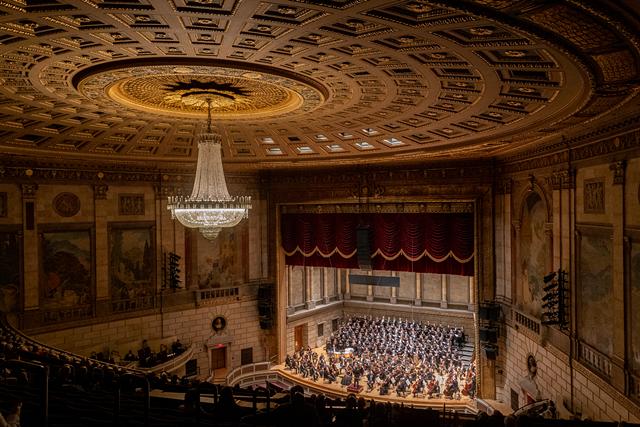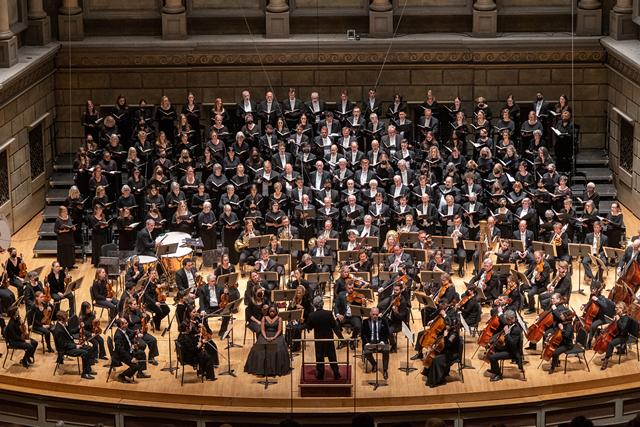
- PHOTO BY TYLER CERVINI
- The Rochester Philharmonic Orchestra, Eastman-Rochester Chorus, and soloists perform Brahms's "A German Requiem" on Nov. 17, 2022.
The world premiere of “A Rage of Peace,” performed Thursday by the Rochester Philharmonic Orchestra with Music Director Andreas Delfs as conductor, provided those elements. It also reflected some of the same musical and emotional qualities of the piece it was paired with in the program: Romantic-era composer Johannes Brahms’s “A German Requiem.”
A large-scale work for orchestra, chorus, and two vocal soloists, the Requiem, which was premiered in 1867 was written by Brahms in the context of his mother’s death two years before, as well as the less recent loss of Brahms’s mentor Robert Schumann. But it’s far from a work of despair. Instead hope, consolation, and ultimately peace — both in the music and in the words — win out.
Brahms's compositional vocabulary is different from that of Skye, whose melting pot of musical languages includes medieval and Renaissance vocal music, Indian classical rhythms, Persian classical melodies, and even hip-hop and pop-influenced phrases But the psychological underpinnings and the use of musical subtleties to articulate an emotional sensibility are similar.
Skye says the composition is thematically about how people are sometimes parented or mentored by a non-parent, and the influence of that person is all the more impactful. It’s unclear from the words in “A Rage of Peace,” which the composer adapted from a poem written by his sister Kiara Skye, who the mentor is in this case. Instead, the spiritual guide at work seems to be engaging in what Derrick Skye calls “Internal mentorship.”
And although the poem suggests inward change, Skye’s music was expressionistic in its use of the orchestra to convey emotional perspective. No one melodic motive had greater importance than another, and no one instrument group took the spotlight.
First cellos, then second violins, and then finally violas took over a brief, introspective theme that returned like a chorus throughout the composition. The countermelody of the flute consistently joined the theme, and its ethereal quality foreshadowed the beautiful straight tone of Jasmine Habersham’s soprano voice.

- PHOTO BY TYLER CERVINI
- Soprano Jasmine Habersham performs with conductor Andreas Delfs and the RPO in Derrick Skye's "A Rage of Peace."
“A Rage of Peace” went on to ask whether or not a question can have more power than an answer, or ever the search for that answer. As the the words eventually become more fragmented and abstract, Habersham sang a realization:
Found question found/ Moving in the gifted find/ Don’t drown/ I find the gifted find.”
Persian-influenced melodies entered, prayer-like at first, before eventually growing long and rhythmically tempestuous. The melodic runs in the woodwinds and strings became so complex and ornate that they began to sound a bit like Mozartean themes.
This musical catharsis soon tapered off, and the initial contemplative tone of the piece returned, as Habersham sang phrases such as “I live in the horizon” and “Unveil the sun.”
Habersham returned as a soloist in the second half of the concert as well, for the Requiem — a somewhat rare double-shift in the world of classical music performance.
As with Skye’s music, Brahms’s Requiem began by highlighting string instruments other than the violins. The basses, cellos, and violas’ collective intro had a kind of rural, calming beauty — a recurring feeling in the seven-movement work.
“A German Requiem” is among the more understated works of its kind compared to iconic funeral masses such Mozart’s — with its savage Dies irae foretelling wrath for sinners — or Benjamin Britten’s “War Requiem,” with its apocalyptic trumpet calls and overt anti-war sentiment.
Instead, Brahms offers muted dynamics, particular in the choral sections. “They that sow in tears shall reap in joy”...”Blessed are they that mourn,” the chorus sang gently.

- PHOTO BY TYLER CERVINI
- RPO Music Director Andreas Delfs leads the orchestra during Brahms's "A German Requiem."
The performance of the Eastman-Rochester Chorus, as led by William Weinert, was lean and exacting. For her interpretation of Brahms, Habersham’s vibrato was tightly wound and up to the task. Baritone soloist Christopher Maltman displayed a resounding tone; he was capable of a variety of timbres, from bright and cutting to rounded and lyrical.

- PHOTO BY TYLER CERVINI
In the case of both compositions, the collective performances were poignant, and perhaps most importantly, the pairing of Skye and Brahms was brilliant. If this is a template the RPO chooses to follow in the future when programming its concerts, commissioning its composers, and interpreting masterworks of the past, the orchestra may soon be living in a new horizon.
The RPO and company perform Skye and Brahms again at Eastman Theatre's Kodak Hallon Saturday, Nov. 19, at 8 p.m. For more information and tickets, go to rpo.org.
Daniel J. Kushner is CITY’s arts editor. He can be reached at [email protected].
